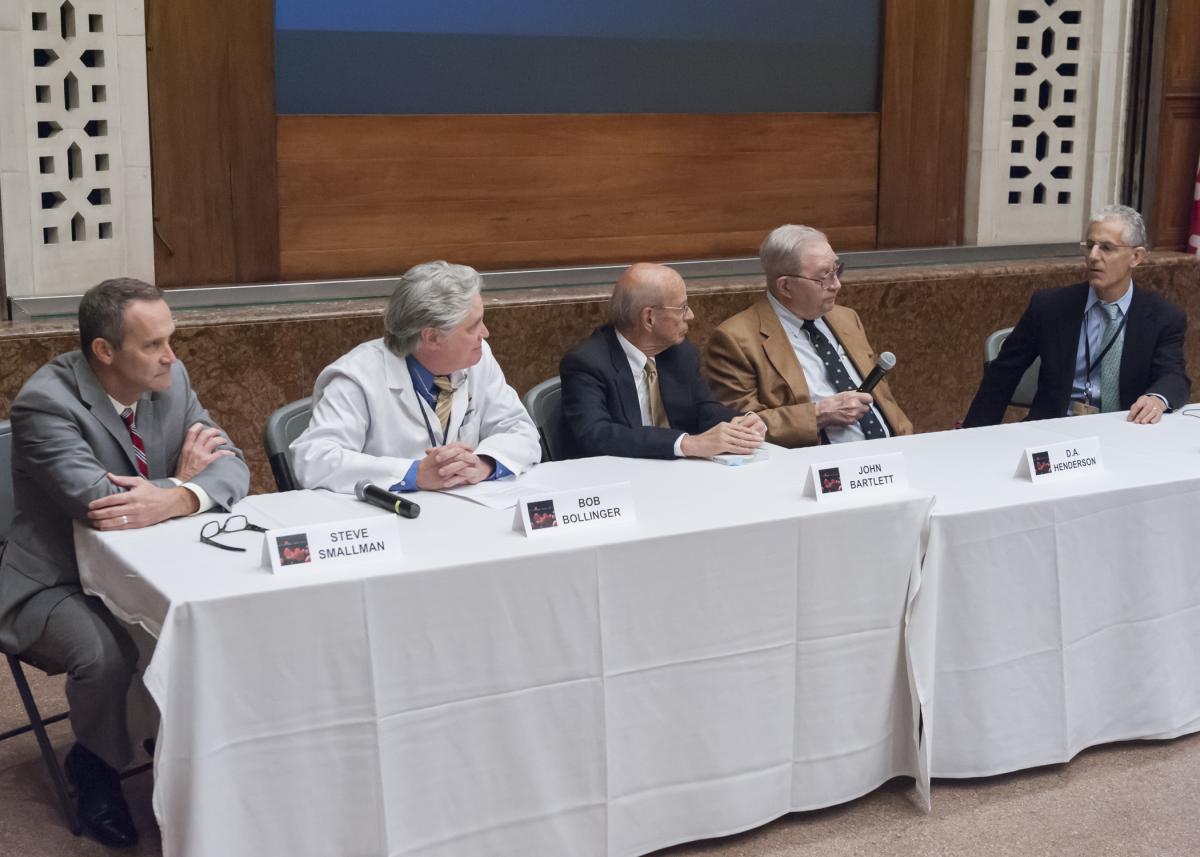Smallpox Comes Back to Life in Microbe Hunters
Baltimore, MD—The world may have been declared free of smallpox in 1980, but the eradication campaign was revived Tuesday in a multimedia presentation at the Johns Hopkins Medical Campus.
The event featured a screening of the film Microbe Hunters: Smallpox, by the Johns Hopkins Center for Clinical Global Health Education (CCGHE) and Baltimore-based digital marketing company 15Four, with funding from Gilead Sciences.
Microbe Hunters: Smallpox is narrated by Dr. John Bartlett, an early pioneer of HIV research and treatment and former Chief of the Division Diseases at Johns Hopkins Medicine, and features original interviews with Dr. D.A. Henderson, who ran the World Health Organization’s global Smallpox Eradication Programme in the 1960s and 1970s.
The feature was shown to an audience of 120 Johns Hopkins medical and public health students and faculty. A panel discussion moderated by Infectious Diseases Chief Dr. Dave Thomas included Bartlett, Henderson, Center for Clinical Global Health Education Director Dr. Bob Bollinger, and 15Four Senior Partner Steve Smallman.
 During the discussion, Dr. Henderson spoke about the dedication of frontline workers, and also about the challenges of the program. The effort was provided with a strikingly small budget for eradication—just $50,000 per country—but Henderson didn’t let that hinder optimism about reaching the goal. “There’s a lot that can be done with not very much if you put your mind to it.” Other eradication stories he shared echoed that same tenacity.
During the discussion, Dr. Henderson spoke about the dedication of frontline workers, and also about the challenges of the program. The effort was provided with a strikingly small budget for eradication—just $50,000 per country—but Henderson didn’t let that hinder optimism about reaching the goal. “There’s a lot that can be done with not very much if you put your mind to it.” Other eradication stories he shared echoed that same tenacity.
The idea for the Microbe Hunters: Smallpox was inspired by the 1926 book by Paul de Kruif that profiles pioneers in infectious diseases.
“The Microbe Hunters book is a fascinating look at the roots of what we practice every day here at Hopkins, and it served as a call to service for me personally,” noted Dr. Bollinger. “There’s a well-chronicled need for education resources that help garner interest in STEM careers. We think the many untold stories about the fight against infectious diseases can help fill that void and even encourage students to pursue ID careers. So we created a format that continues de Kruif’s legacy of great clinical and public health storytelling on a platform that resonates with today’s audiences.” Dr. Bartlett concurred about the value of great stories about large and well-coordinated efforts to contain and control disease. “I worry when I talk with young people in my field of infectious diseases who have no idea what happened. I don’t want these stories to get away.”
